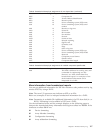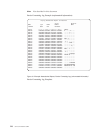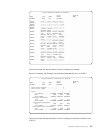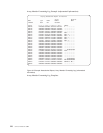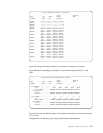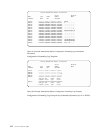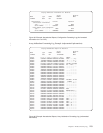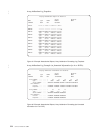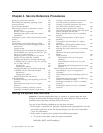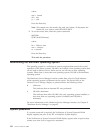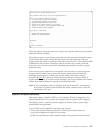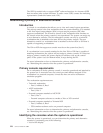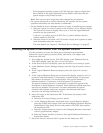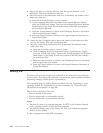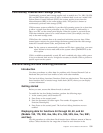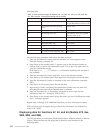
Chapter 4. Service Reference Procedures
Setting the system date and time .......125
Determining the dominant operating system . . . 126
System password ............126
System unique identifier..........127
Determining a primary or alternative console. . . 128
Introduction .............128
Primaryconsolerequirements.......128
Identifying the consoles when the system is
operational .............128
Locating the system’s load source from the system
console...............129
History file ..............130
Continuously Powered Main Storage (CPM) . . . 131
Low-level debug and data collecting procedures 131
Introduction .............131
Getting started ............131
Displaying data for functions 54 through 58, 63,
and 64 (Models 150, 170, 250, 4xx, 50x, 51x, 530,
53S, 6xx, 7xx, SB1, and Sxx) .......131
Displaying data for functions 57, 63, and 64
(Models 270, 8xx, SB2, SB3, and 890) ....132
Changing the address in functions 59 through
61 (Models 150, 170, 250, 4xx, 50x, 51x, 530, 53S,
6xx, 7xx, SB1, and Sxx) .........133
Introduction ............133
Changing the address ........134
Changing the address in functions 58 through
61 (Models 270, 8xx, SB2, SB3, and 890) . . . 135
Introduction ............135
Changing the address ........135
Displaying data from function 62......136
Logical partitions ............136
Examples: Missing or non-reporting system bus
resources..............137
Determining the release level of a logical
partition ..............138
Locating a secondary partition’s console . . . 138
Locating a secondary partition’s load source . . 139
Locating a secondary partition’s load source
from the secondary partition’sconsole....139
Locating a secondary partition’s load source
from the primary partition’sconsole.....140
Querying logical partition time and date . . . 141
Converting secondary partition time and date to
primary partition time and date ......141
Finding the SRC history list for a secondary
partition ..............141
Closing related problems in other logical
partitions ..............141
Accessing the panel functions of a logical
partition ..............142
Determining which logical partition owns a
FRU or a system I/O resource.......142
Selecting IPL source and mode for a secondary
partition ..............143
Options on the Work with Partition Status
display..............143
Guest partitions ...........147
Determining if the system has guest
partitions .............148
Determining the release level of a guest
partition .............148
Determining the hosting partition of a guest
partition .............148
IASP/Clustering Service Reference Procedures . . 149
Determining if a tower is configured as
switchable .............149
Determining the power controlling system of a
tower...............150
Determining the resource name and HSL loop
numberofanHSLI/Obridge.......152
Switching ownership of a tower’s switchable
resources..............154
Switching the mode of a tower’s switchable
resources..............156
Setting the system date and time
Attention: Customer applications may be sensitive to system date and time
settings. Incorrect date and time settings may cause data loss. Ensure that the
customer knows the date and time that you have set.
Use one of the following methods to set the date and time:
v If the system is powered off, perform a Manual mode (attended) IPL. You can
set the date and time on the IPL Options display. See the iSeries Information
Center for information.
v If the system is powered on, perform the following procedure:
1. To set the correct date, enter the system command:
CHGSYSVAL QDATE VALUE(’mmddyy’)
© Copyright IBM Corp. 1997, 2002 125



